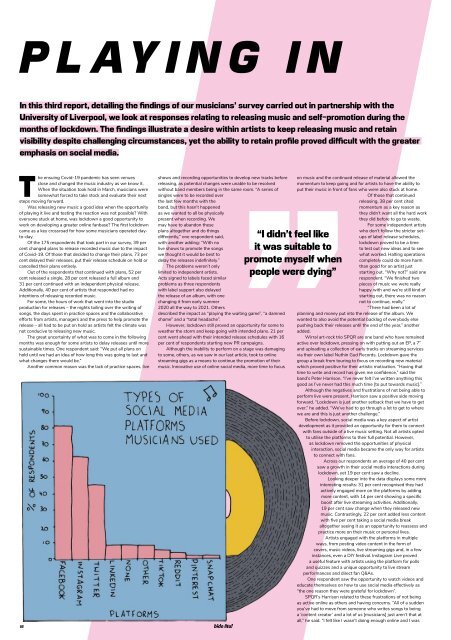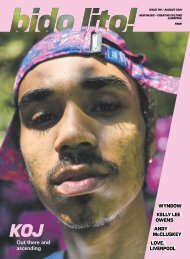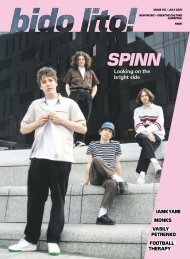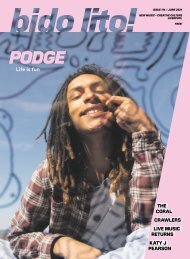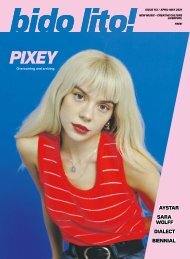Issue 111 / November 2022
November 2020 issue of Bido Lito! magazine. Featuring: COURTING, TABITHA JADE, RED RUM CLUB, THE REAL THING, MIC LOWRY, ANTHONY WILDE, STONE, BEN BURKE, FOX FISHER, SHE DREW THE GUN, THE SINGH TWINS, DON MCCULLIN and much more.
November 2020 issue of Bido Lito! magazine. Featuring: COURTING, TABITHA JADE, RED RUM CLUB, THE REAL THING, MIC LOWRY, ANTHONY WILDE, STONE, BEN BURKE, FOX FISHER, SHE DREW THE GUN, THE SINGH TWINS, DON MCCULLIN and much more.
Create successful ePaper yourself
Turn your PDF publications into a flip-book with our unique Google optimized e-Paper software.
PLAYING IN<br />
In this third report, detailing the findings of our musicians’ survey carried out in partnership with the<br />
University of Liverpool, we look at responses relating to releasing music and self-promotion during the<br />
months of lockdown. The findings illustrate a desire within artists to keep releasing music and retain<br />
visibility despite challenging circumstances, yet the ability to retain profile proved difficult with the greater<br />
emphasis on social media.<br />
The ensuing Covid-19 pandemic has seen venues<br />
close and changed the music industry as we know it.<br />
When the situation took hold in March, musicians were<br />
somewhat forced to take stock and evaluate their next<br />
steps moving forward.<br />
Was releasing new music a good idea when the opportunity<br />
of playing it live and testing the reaction was not possible? With<br />
everyone stuck at home, was lockdown a good opportunity to<br />
work on developing a greater online fanbase? The first lockdown<br />
came as a key crossroad for how some musicians operated dayto-day.<br />
Of the 175 respondents that took part in our survey, 39 per<br />
cent changed plans to release recorded music due to the impact<br />
of Covid-19. Of those that decided to change their plans, 73 per<br />
cent delayed their releases, put their release schedule on hold or<br />
cancelled their plans entirely.<br />
Out of the respondents that continued with plans, 52 per<br />
cent released a single, 28 per cent released a full album and<br />
31 per cent continued with an independent physical release.<br />
Additionally, 40 per cent of artists that responded had no<br />
intentions of releasing recorded music.<br />
For some, the hours of work that went into the studio<br />
production for releases – the nights toiling over the writing of<br />
songs, the days spent in practice spaces and the collaborative<br />
efforts from artists, managers and the press to help promote the<br />
release – all had to be put on hold as artists felt the climate was<br />
not conducive to releasing new music.<br />
The great uncertainty of what was to come in the following<br />
months was enough for some artists to delay releases until more<br />
sustainable times. One respondent said: “We put all plans on<br />
hold until we had an idea of how long this was going to last and<br />
what changes there would be.”<br />
Another common reason was the lack of practice spaces, live<br />
16<br />
shows and recording opportunities to develop new tracks before<br />
releasing, as potential changes were unable to be resolved<br />
without band members being in the same room. “A series of<br />
singles were to be recorded over<br />
the last few months with the<br />
band, but this hasn’t happened<br />
as we wanted to all be physically<br />
present when recording. We<br />
may have to abandon these<br />
plans altogether and do things<br />
differently,” one respondent said,<br />
with another adding: “With no<br />
live shows to promote the songs<br />
we thought it would be best to<br />
delay the releases indefinitely.”<br />
The problems weren’t only<br />
limited to independent artists.<br />
Acts signed to labels faced similar<br />
problems as three respondents<br />
with label support also delayed<br />
the release of an album, with one<br />
changing it from early summer<br />
2020 all the way to 2021. Others<br />
described the impact as “playing the waiting game”, “a damned<br />
shame” and a “total headache”.<br />
However, lockdown still proved an opportunity for some to<br />
weather the storm and keep going with intended plans. 21 per<br />
cent went ahead with their intended release schedules with 16<br />
per cent of respondents starting new PR campaigns.<br />
Although the inability to perform on a stage was damaging<br />
to some, others, as we saw in our last article, took to online<br />
streaming gigs as a means to continue the promotion of their<br />
music. Innovative use of online social media, more time to focus<br />
“I didn’t feel like<br />
it was suitable to<br />
promote myself when<br />
people were dying”<br />
on music and the continued release of material allowed the<br />
momentum to keep going and for artists to have the ability to<br />
put their music in front of fans who were also stuck at home.<br />
Of those that continued<br />
releasing, 38 per cent cited<br />
momentum as a key reason as<br />
they didn’t want all the hard work<br />
they did before to go to waste.<br />
For some independent artists<br />
who don’t follow the stricter setups<br />
of label release schedules,<br />
lockdown proved to be a time<br />
to test out new ideas and to see<br />
what worked. Halting operations<br />
completely could do more harm<br />
than good for an artist just<br />
starting out. “Why not?” said one<br />
respondent. “We finished two<br />
pieces of music we were really<br />
happy with and we’re still kind of<br />
starting out, there was no reason<br />
not to continue, really.”<br />
“There had been a lot of<br />
planning and money put into the release of the album. We<br />
wanted to also avoid the potential backlog of everybody else<br />
pushing back their releases until the end of the year,” another<br />
added.<br />
Wirral art-rock trio SPQR are one band who have remained<br />
active over lockdown, pressing on with putting out an EP, a 7”<br />
and uploading a collection of early tracks on streaming services<br />
via their own label Nuthin Gud Records. Lockdown gave the<br />
group a break from touring to focus on recording new material<br />
which proved positive for their artistic motivation. “Having that<br />
time to write and record has given me confidence,” said the<br />
band’s Peter Harrison. “I’ve never felt I’ve written anything this<br />
good as I’ve never had this much time [to put towards music].”<br />
Although the negatives and frustrations of not being able to<br />
perform live were present, Harrison saw a positive side moving<br />
forward. “Lockdown is just another setback that we have to get<br />
over,” he added. “We’ve had to go through a lot to get to where<br />
we are and this is just another challenge.”<br />
Before lockdown, social media was a key aspect of artist<br />
development as it provided an opportunity for them to connect<br />
with fans outside of a live music setting. Not all artists opted<br />
to utilise the platforms to their full potential. However,<br />
as lockdown removed the opportunities of physical<br />
interaction, social media became the only way for artists<br />
to connect with fans.<br />
Across our respondents an average of 40 per cent<br />
saw a growth in their social media interactions during<br />
lockdown, yet 19 per cent saw a decline.<br />
Looking deeper into the data displays some more<br />
interesting results: 31 per cent recognised they had<br />
actively engaged more on the platforms by adding<br />
more content, with 14 per cent showing a specific<br />
boost after live streaming activities. Additionally,<br />
19 per cent saw change when they released new<br />
music. Contrastingly, 22 per cent added less content<br />
with five per cent taking a social media break<br />
altogether seeing it as an opportunity to reassess and<br />
practice more on their music or personal lives.<br />
Artists engaged with the platforms in multiple<br />
ways, from posting video content in the form of<br />
covers, music videos, live streaming gigs and, in a few<br />
instances, even a DIY festival. Instagram Live proved<br />
a useful feature with artists using the platform for polls<br />
and quizzes and a unique opportunity to live stream<br />
performances and direct fan Q&As.<br />
One respondent saw the opportunity to watch videos and<br />
educate themselves on how to use social media effectively as<br />
“the one reason they were grateful for lockdown”.<br />
SPQR’s Harrison related to these frustrations of not being<br />
as active online as others and having concerns. “All of a sudden<br />
you’ve had to move from someone who writes songs to being<br />
a ‘content creator’ and a lot of us [musicians] just aren’t that at<br />
all,” he said. “I felt like I wasn’t doing enough online and I was


